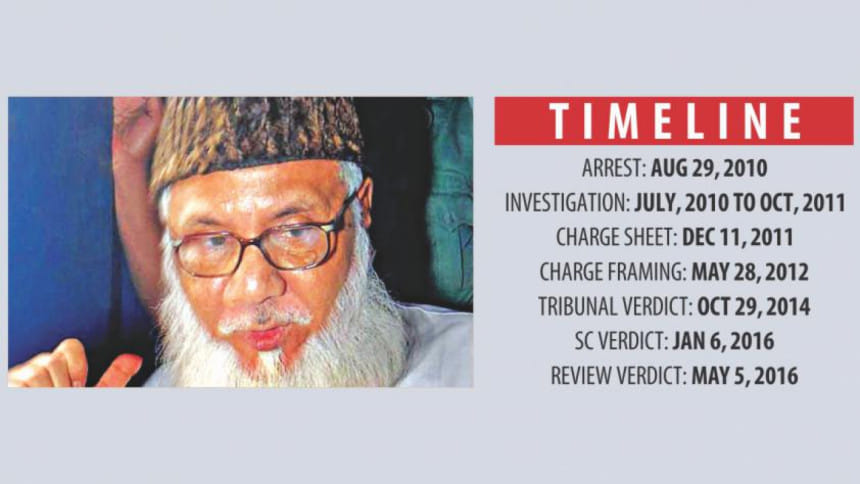Long delays in Nizami’s trial

The investigation into the war crimes of Jamaat-e-Islami leaders Motiur Rahman Nizami and Abdul Quader Mollah began on the same day in July 2010. Charges were framed against the duo on the same day in May of 2012.
The cases, however, had different paces from then on.
The entire legal procedures of Quader Mollah’s case ended on December 12, 2013 and he was executed that very day.
Nizami's legal proceedings ended yesterday, nearly two and a half years after Quader Mollah was executed.
Nizami’s case took around 36 months, from indictment to the final verdict, due to alleged delaying tactics of the defence; the Chittagong arms haul case, in which Nizami was an accused and had been sentenced to death; reconstitution of the International Crimes Tribunal-1; changes of prosecutors; and the convict's "illness" on the day of verdict delivery, according to two prosecutors and media reports.
The Supreme Court dismissed his petition seeking review of the apex court's order that upheld his death penalty for the crimes he committed during the 1971 Liberation War.
Nizami was shown arrested on August 2, 2010, in the war crimes case along with his party colleagues Ali Ahsan Mohammad Mojaheed, Muhammad Kamaruzzaman and Abdul Quader Mollah.
As the trial began after their indictment, defence counsels brought an array of time petitions for what the prosecution said was to delay the trial.
Besides, defence counsels remained absent on hartal days citing "security concerns and personal grounds", prompting the tribunal to defer trial proceedings.
The tribunal on several occasion fined defence counsels for not showing up before the court even though it had offered to provide necessary protection for the counsels on hartal days.
Amid the defence failing to show up, the tribunal on November 13, 2013, concluded the case proceedings.
The tribunal, however, allowed the defence to place their closing arguments and the case finally ended on November 20 that year.
The trial suffered another setback when the then chairman of the tribunal Justice ATM Fazle Kabir went on retirement in January, 2014, without delivering the verdict.
Fifty-three days after his retirement, the tribunal was reconstituted on February 23 with a new chairman, Justice M Enayetur Rahim, and the tribunal decided to hear the closing arguments once again.
Closing arguments of the prosecution and the defence went on between March 10 and March 24 when the tribunal concluded the case proceedings.
The tribunal on June 23, 2014, fixed the following day for delivering the verdict but could not do so as the jail authorities did not produce Nizami before the tribunal citing him being "sick".
The trial of Nizami was also bogged down due to his being an accused in the sensational 10-truck arms haul case of 2004. The government had to send him to Chittagong usually twice a month so that he could appear before a court there.
In August, 2013, the tribunal, in an extraordinary move, overcame this barrier with an order that Nizami was not to be produced in the Chittagong court, if proceedings of the two cases coincided.
On top of this, change of the conducting prosecutor twice, poor preparations of the prosecution and its failure to produce witnesses caused more delays, this paper learnt.
The progress of all cases at Tribunal-1, including Nizami's case, had stalled for a couple of weeks in December, 2012, following the “Skype scandal”. The defence had filed petitions for a retrial but it was rejected on January 3, 2013.
Tribunal-1 finally delivered the verdict on October 29, 2014. Nizami, however, challenged the verdict before the Supreme Court seeking acquittal from all charges.
After the apex court on January 6 this year upheld his death penalty and Nizami sought review of the verdict, and the court on May 5 this year rejected the petition bringing an end to the long legal battle.
Nizami was executed early today.

 For all latest news, follow The Daily Star's Google News channel.
For all latest news, follow The Daily Star's Google News channel. 



Comments